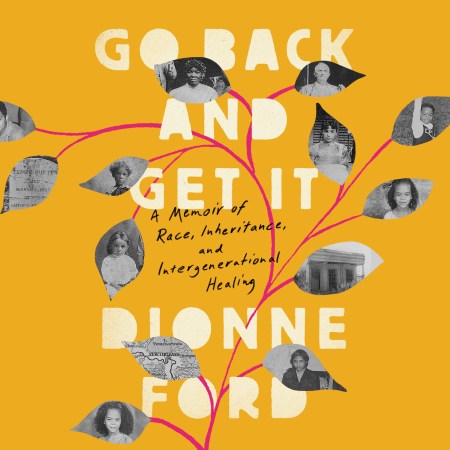Shopping Cart
Go Back and Get It
A Memoir of Race, Inheritance, and Intergenerational Healing
Description
An unexpected family photograph leads Dionne Ford to uncover the stories of her enslaved female ancestors, reclaim their power, and begin to heal
Countless Black Americans descended from slavery are related to the enslavers who bought and sold their ancestors. Among them is Dionne Ford, whose great grandmother was the last of six children born to a Louisiana cotton broker and the enslaved woman he received as a wedding gift.
What shapes does this kind of intergenerational trauma take? In these pages, which move between her inner life and deep research, Ford tells us. It manifests as alcoholism and post-traumatic stress; it finds echoes in her own experience of sexual abuse at the hands of a relative, and in the ways in which she builds her own interracial family.
To heal, Ford tries a wide range of therapies, lifestyle changes, and recovery meetings. “Anything,” she writes, “to keep from going back there.” But what she learns is that she needs to go back there, to return to her female ancestors, and unearth what she can about them to start to feel whole.
Countless Black Americans descended from slavery are related to the enslavers who bought and sold their ancestors. Among them is Dionne Ford, whose great grandmother was the last of six children born to a Louisiana cotton broker and the enslaved woman he received as a wedding gift.
What shapes does this kind of intergenerational trauma take? In these pages, which move between her inner life and deep research, Ford tells us. It manifests as alcoholism and post-traumatic stress; it finds echoes in her own experience of sexual abuse at the hands of a relative, and in the ways in which she builds her own interracial family.
To heal, Ford tries a wide range of therapies, lifestyle changes, and recovery meetings. “Anything,” she writes, “to keep from going back there.” But what she learns is that she needs to go back there, to return to her female ancestors, and unearth what she can about them to start to feel whole.
Newsletter Signup
By clicking ‘Sign Up,’ I acknowledge that I have read and agree to Hachette Book Group’s Privacy Policy and Terms of Use
Praise
“A fascinating American odyssey quite unlike any other you are likely to encounter, beautifully written, heartfelt, at times painfully candid, and deeply moving.”
—Joyce Carol Oates
“Go Back and Get It tells the remarkable story of Dionne Ford’s search for healing both in the present and in the past. This book offers inspiration and hope for everyone who wants to discover their ancestry and who seeks to connect their own trauma to larger social structures. Ford’s thesis that America is founded on the rape of black women is convincing and terrible, but her understanding is a gift and a triumph.”
—Alice Elliott Dark, author of Fellowship Point and In the Gloaming
“In this piercing, moving memoir, Dionne Ford opens the doors to her family’s past and reclaims the lost history of her enslaved ancestors, finding healing for her personal traumas and offering a vision of how our nation might heal its own. She shows us that the painful truths that we often keep buried are the ones we must unearth if we are ever to become whole.”
—Rachel L. Swarns, author of American Tapestry and The 272
“Go Back and Get It nails that magical balance only the best memoirs can manage, equal parts unflinching and tender. With effortless prose, Ford shares a captivating story that teaches us not only about her life, but about ourselves—as individuals and as a nation—and positions her as an essential American literary voice.”
—Sara Novic, New York Times–bestselling author of True Biz
“Few writers offer both urgent clarity of vision and arresting, innovative, powerful prose, but Ford does with Go Back and Get It. The stakes of this book could not be higher—what Ford is writing for here is nothing less than to save her own life and the lives of other Black and multiracial women—but line by line, this book is perfect.”
—Emma Copley Eisenberg, author of The Third Rainbow Girl
“Ford’s tenacious, openhearted, poetic Go Back and Get It took my breath away. On her thirty-eighth birthday, Ford found a photo of her great-great grandmother with the white man who’d enslaved her—also Ford’s ancestor—and two of the six children they had together. Seeing these forerunners of her own most wrenching experiences deepened and clarified a search that Ford had been moving toward since childhood. The result is transcendent: memoir and quest, critique and exhortation, a distillation of wisdom profound as the Psalms.”
—Maud Newton, author of Ancestor Trouble
“The parallels Ford draws between her personal traumas and the ongoing struggle among Black Americans to find wholeness and validation—in the form of reparations and other measures—make her narrative especially compelling. That she was able to find connection with lost Black relatives who would become some of her greatest sources of support helps transform a book about multigenerational loss into one about the healing power of community. A cathartic reading experience.”
—Kirkus Reviews

